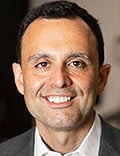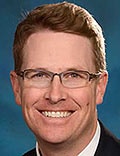Intranasal Schirmer Test Shows Promise in Allergy Diagnosis Intranasal Schirmer Test Shows Promise in Allergy Diagnosis
May 23, 2025AI Is Coming for Healthcare Call Centers AI Is Coming for Healthcare Call Centers
May 23, 2025Alex Jahangir, MD, was thrilled 16 years ago to land a job as an orthopedic trauma surgeon at Vanderbilt University Medical Center in Nashville, Tennessee. But between the time he was hired and the time he started his job, turmoil erupted within the department leaving him without much support.

One of the partners in the practice became ill, and “a lot of extra hands” were needed, Jahangir said. Yet several other surgeons had left. When he arrived for his first day of work, he didn’t have an office space or a parking badge, and he was the only doctor taking calls for the team.
“What have you gotten yourself into?” he recalls his wife asking him.
Once a physician completes residency or fellowship training and becomes an attending physician, “the buck stops with you,” Jahangir told Medscape Medical News. Even for physicians entering jobs without the turmoil Jahangir experienced in his department, the transition to attending is not easy. “Truly…it’s scary, it’s hard, it can be very lonely…,” he said.
“As an attending, all of a sudden you realize people will listen to you and…maybe you’re not fully sure that’s the right thing to do or say, but you recognize ‘Hey…this is what I have to do,’” Jahangir said.
Residency training is generally done in a stepwise fashion with increasing levels of responsibility over the years, said John Allen, MD, assistant dean of student affairs at the University of Maryland School of Medicine in Baltimore. Most young attendings are “very well prepared and able to jump right in,” he said. Still, becoming an attending is a transition.
“The biggest difference to me was things that felt routine when I was a resident — when I had that safety net — suddenly felt like much higher stakes when I was an attending,” Allen said.
What are the best ways to navigate the transition from resident to attending with the accompanying shifts in responsibility and accountability? Medscape Medical News reached out to experts in the field to get their take.
‘So Hard’
“The first year is so hard because we all have complications. We all feel the stress of everything, thinking you should have all the answers,” said Jahangir, who now serves as vice chair in the Department of Orthopaedic Surgery and senior vice president for Provider Network Development at Vanderbilt University Medical Center.

Young doctors need to recognize what they don’t know, Allen said, adding that this self-awareness is important at all levels of training but becomes even more key when doctors become attendings.
It’s important to realize that mistakes can happen, Jahangir said.Don’t think you’re the only one who has ever had this happen, he said.
Staying up to date on medical guidelines and research becomes more self-driven as an attending, Allen said. Continuing medical education is more “curated” during training years and that changes as an attending.
“Make sure that you’re reading. Staying current becomes more of something you have to deliberately do as an attending,” Allen said.
At the same time, a little grace is good. Recognize that it is normal to feels self-aware that you don’t have much experience as a new attending. Imposter syndrome is real, Allen said.
“A lot of people do experience that when they’re a new attending,” he said. “As you settle in and realize that you’re making good decisions, you are helping, that imposter syndrome does tend to lift over time.”
Only after 16 years of practice can Jahangir finally say that when a student or resident approaches him to discuss a patient case, based on his breadth of knowledge in orthopedic trauma surgery, “I probably have seen it or have heard about it or could have an intelligent conversation about it,” he said.
Not only the practice of medicine but also people skills matter, Jahangir said. For example, if early career surgeons don’t learn certain skills — like how to manage an operating room — well in the first year or two of practice, “I think it leads to a cascade of bad stuff that can happen in one’s career that may eventually lead you to quit medicine, or to have a bad patient outcome, or to have a bad professional or liability outcome,” Jahangir said.
Be Thoughtful in Job Searching
There are also steps a resident or fellow can take before becoming an attending to help ease the transition, such as being proactive when job searching, experts said.
“It’s good to get a sense of the partners you’re joining,” Jahangir advised and to see what the general “gestalt” is at the practice.
“Because if you have a bunch of partners that obviously aren’t, don’t care and only see you as a source so they have to take less calls, that may not result to a long-term successful practice,” he said.
Before signing on, early-career doctors should also ask about how the practice supports a new physician, Jahangir advised. Try to find out how many doctors have left the practice within the first 2 years of joining, he suggests. “Practices that have physicians that stay there 20, 30 years are probably a good, functional group of people.”

It’s also crucial to read your employment contract carefully before accepting your first job out of residency or moving to a new one, said Maria Phillis, MD, an Ohio physician who is also chair of the Young Physician Section at the Ohio State Medical Association, Columbus, Ohio, a lobbying group. Phillis also has a law degree.
“Like really read it,” she said of the contract. “Really understand what [malpractice] coverage you are being offered. If it doesn’t explain in your contract what that looks like, then ask for supplemental documents or policies that exist,” she said.
“Have a really clear understanding of what it is that the hospital is willing to cover for you, whenever you leave that position,” Phillis said.
Many early-career doctors change jobs within a couple of years, so it’s important to make sure that you have a tail coverage that’s either covered by your employer or that you’re covering, Phillis said. Tail coverage applies to malpractice claims made after the physician’s policy ends regarding services rendered during the policy coverage.
Seek Support
Once in the job, make sure to cultivate a solid support network, experts said.
Just like a newly hired chief executive officer might hire a professional coach, new attending doctors should seek out support too, Jahangir said. “It’s a big job. Anytime there’s a big transition into a big job, it’s good to have that.”
Early-career doctors might be hesitant to ask colleagues to talk through a patient case or ask for help if needed, but they should do it anyway, experts suggested. Asking for help is a sign of strength, Allen said.
“If you genuinely are not confident, phone a friend. Like ask for help. That help is still there,” Allen said. “You may think it’s not, but there are lots of ways that you can curbside a friend or run a case with a mentor.”
“It’s ok to feel overwhelmed and get help,” Jahangir said.
He was able to survive the chaotic start to his job in large measure because a mutual friend introduced him to someone who became a mentor — the healthcare group’s deputy chief executive officer Wright Pinson, MD. Pinson saw that Jahangir was drowning, “and he took me under his wing, and he gave me the support and he would check in on me,” Jahangir said.
Get Your Financial House in Order
The job is not the only thing that will change after becoming an attending. There are also personal transitions that go along with it.
“Recognize that you’re transitioning not only to a new career, but your life changes such as your tax bracket changes and people approach you differently,” Jahangir said, adding that some who approach don’t always do so with the greatest intent, he said. “Like, all of a sudden every financial advisor wants to come hang out.”
Make sure you have a good financial plan in place to stay secure, he advises. For example, Jahangir never thought about life insurance or disability insurance as a resident.
Early-career physicians are often paying back loans and potentially have lots of credit card debt from trying to survive on a resident’s salary, Phillis said. “Now you’re out of training, and you’re trying to figure out what to do with your salary so that you are financially stable,” she said.
More Than the Practice of Medicine
Before he was invited to lead his division 8 years ago, Jahangir observed that every year there would be turnover in his department.
“And I realized that the reason people were coming and going was because nobody was thinking about the other part of it,” he said, referring to work-life balance. “So now when we hire someone, I’m like, what is it that you, what excites you outside of medicine?”
To protect personal time, Jahangir changed journal club from evening to early morning hours. He also supported team members in pursuing their outside interests. One colleague ran for political office, while another who had an interest in agriculture took a more active role on his farm.
It shows “that if you build a supportive system that people — the work’s hard, but people know they come here and we’ll support them professionally and personally,” Jahangir said.
